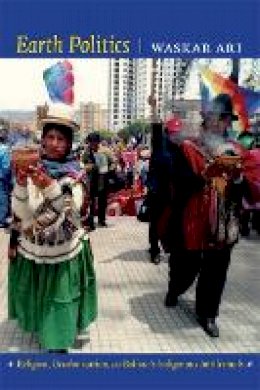
Stock image for illustration purposes only - book cover, edition or condition may vary.
Earth Politics: Religion, Decolonization, and Bolivia´s Indigenous Intellectuals
Waskar Ari
€ 45.70
FREE Delivery in Ireland
Description for Earth Politics: Religion, Decolonization, and Bolivia´s Indigenous Intellectuals
Paperback. Focuses on the lives of four indigenous activist-intellectuals in Bolivia, key leaders in the Alcaldes Mayores Particulares (AMP), a movement established to claim rights for indigenous education and reclaim indigenous lands from hacienda owners. Series: Narrating Native Histories. Num Pages: 280 pages, 19 illustrations. BIC Classification: 1KLSL; JFSL9. Category: (G) General (US: Trade). Dimension: 230 x 153 x 15. Weight in Grams: 384.
Earth Politics focuses on the lives of four indigenous activist-intellectuals in Bolivia, key leaders in the Alcaldes Mayores Particulares (AMP), a movement established to claim rights for indigenous education and reclaim indigenous lands from hacienda owners. The AMP leaders invented a discourse of decolonization, rooted in part in native religion, and used it to counter structures of internal colonialism, including the existing racial systems. Waskar Ari calls their social movement, practices, and discourse earth politics, both because the AMP emphasized the idea of the earth and the place of Indians on it, and because of the political meaning that the AMP gave to the worship of the Aymara gods. Depicting the social worlds and life work of the activists, Ari traverses Bolivia's political and social landscape from the 1920s into the early 1970s. He reveals the AMP 's extensive geographic reach, genuine grassroots quality, and vibrant regional diversity. Ari had access to the private archives of indigenous families, and he collected oral histories, speaking with men and women who knew the AMP leaders. The resulting examination of Bolivian indigenous activism is one of unparalleled nuance and depth.
Product Details
Format
Paperback
Publication date
2014
Publisher
Duke University Press
Condition
New
Series
Narrating Native Histories
Number of Pages
280
Place of Publication
North Carolina, United States
ISBN
9780822356172
SKU
V9780822356172
Shipping Time
Usually ships in 7 to 11 working days
Ref
99-1
About Waskar Ari
Waskar Ari is Assistant Professor of History and Ethnic Studies/Latin American Studies at the University of Nebraska, Lincoln.
Reviews for Earth Politics: Religion, Decolonization, and Bolivia´s Indigenous Intellectuals
"A good summary of the Bolivian AMP for all Latin American social science researchers. . . . Highly recommended. All levels and libraries."
D. L. Browman
Choice
"This is really a treasure, a lens into the lives, visions, and political practices of the forebears of the contemporary movement that is changing Bolivia."
Nancy Postero & Devin Beaulieu
Journal of the Royal Anthropological Institute
"This book is recommended for readers interested in indigenous history, Andean religious practices, or for use in courses on law, politics, or race in Latin America."
Colonial Latin American Historical Review
"Ari’s work is a valuable contribution to our understanding of the longer histories of indigenous revitalization in Bolivia.... [S]tudents of Latin America should read it closely to gain a fuller understanding of both the complexities of indigenous political projects and the stubborn durability of the colonial foundations of the Latin American state."
Bret Gustafson
The Historian
D. L. Browman
Choice
"This is really a treasure, a lens into the lives, visions, and political practices of the forebears of the contemporary movement that is changing Bolivia."
Nancy Postero & Devin Beaulieu
Journal of the Royal Anthropological Institute
"This book is recommended for readers interested in indigenous history, Andean religious practices, or for use in courses on law, politics, or race in Latin America."
Colonial Latin American Historical Review
"Ari’s work is a valuable contribution to our understanding of the longer histories of indigenous revitalization in Bolivia.... [S]tudents of Latin America should read it closely to gain a fuller understanding of both the complexities of indigenous political projects and the stubborn durability of the colonial foundations of the Latin American state."
Bret Gustafson
The Historian
